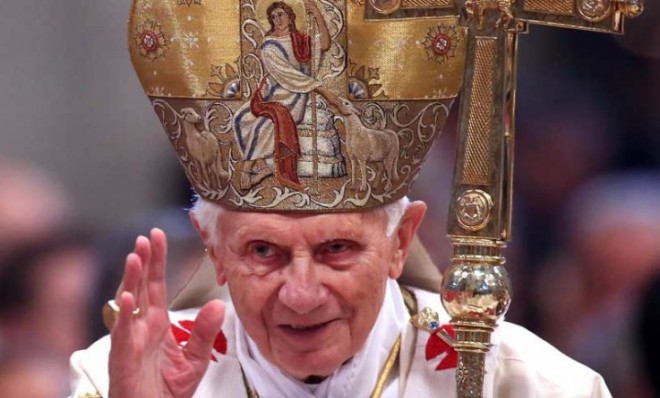Should the Pope follow someone on Twitter other than himself?
"He won't follow anyone for now," says one adviser. "He will be followed."


A free daily email with the biggest news stories of the day – and the best features from TheWeek.com
You are now subscribed
Your newsletter sign-up was successful
Pope Benedict XVI on Monday announced that he had joined Twitter, part of a campaign by the leader of the Roman Catholic Church to better connect with his 1.2-billion-strong flock. Benedict chose the handle @pontifex — Latin for "pontiff" — and is already being followed by more than 240,000 people. But Benedict isn't exactly returning the love: He is following only seven other Twitter accounts, all of which are foreign-language versions of himself in which he speaks in different tongues.
Of course, everyone knows the Pope himself probably won't be signing on to Twitter and keeping up with the latest from the Biebs. (After the pope physically clicks "send" on his first tweet on Dec. 12, his staff members will be the ones sending out Pope-approved messages.) But if the whole point of the exercise is to recognize a social media connection with his religious followers, shouldn't he at least follow (and thus receive messages from) someone other than himself? "Too many celebrities and leaders on Twitter make the mistake of using it only as a transmission system without following any other users," says Joshua Keating at Foreign Policy. "Benedict could start with other religious leaders, or political figures like Barack Obama and David Cameron."
Indeed, @barackobama follows nearly 670,000 people, while @whitehouse follows 168 (mostly government departments, which means the different parts of the executive branch could technically communicate with each over Twitter). But clearly, the term "follow" seems potentially problematic for a religious leader. "He won't follow anyone for now," said Greg Burke, a communications adviser to the Pope. "He will be followed." In fact, the Dalai Lama, a frequent Tweeter, follows exactly zero people. And if Benedict were to follow members of his own church, he could bruise the feelings of those who were excluded. "If he follows a cardinal, then why not an archbishop?" said Burke. "You can see where it could get tricky."
The Week
Escape your echo chamber. Get the facts behind the news, plus analysis from multiple perspectives.

Sign up for The Week's Free Newsletters
From our morning news briefing to a weekly Good News Newsletter, get the best of The Week delivered directly to your inbox.
From our morning news briefing to a weekly Good News Newsletter, get the best of The Week delivered directly to your inbox.
And while the Pope is brand new to social media, he is not entirely unfamiliar with its pitfalls. "In a document issued last year, he said the possibilities of new media and social networks offered 'a great opportunity,'" says Phillip Pullella at Reuters, "but warned of the risks of depersonalization, alienation, self-indulgence, and the dangers of having more virtual friends than real ones." On second thought, perhaps Benedict knows exactly what he's doing.
A free daily email with the biggest news stories of the day – and the best features from TheWeek.com
Ryu Spaeth is deputy editor at TheWeek.com. Follow him on Twitter.


